A special ensaymada recipe (Filipino sweet buns) you’ll love
This special ensaymada recipe (also known as Filipino sweet buns) is a sweet and cheesy bread usually paired with coffee.
It can be bought from any bakery and is usually enjoyed as a mid-afternoon snack. However, due to its accessibility, ensaymada can actually be eaten at any time of the day.
Let’s make a batch!
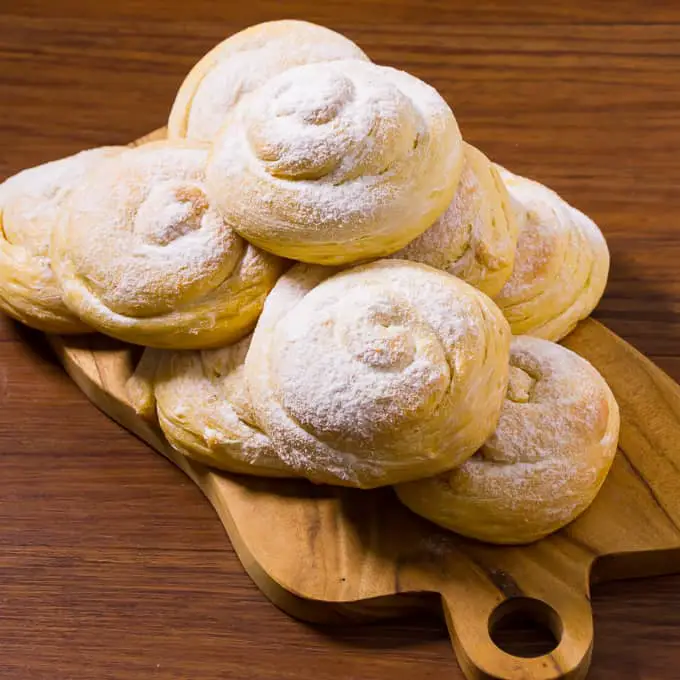
Apparently, this bread (which has proved to be a well-loved Filipino food) is actually an assimilated form of the original “ensaimada” from Spain with other varieties across South and Latin American countries.
However, with ensaimada being a hit with native Filipinos, this bread morphed into something that’s truly Filipino.
This ensaymada recipe includes flour, cheese, butter, honey, salt, water, white sugar, and cheddar cheese in its list of ingredients. The secret is not to over-knead the dough – that’s how you get the perfect texture!
With these ingredients, I assure you that ensaymadas are going to become your favorite!

Check out our new cookbook
Bitemybun's family recipes with complete meal planner and recipe guide.
Try it out for free with Kindle Unlimited:
Read for freeIn this post we'll cover:
How to make ensaymada at home
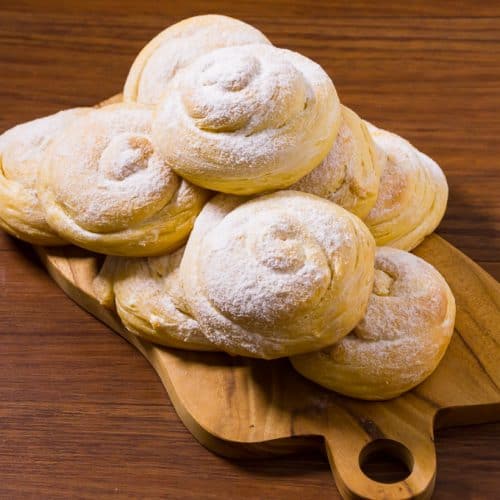
Ensaymada Recipe (Filipino Sweet Buns)
Ingredients
- 2 tsp instant yeast
- ⅔ cup water (lukewarm)
- 3½ cups all-purpose flour
- ⅓ cup sugar
- ½ tsp salt
- 3 large eggs
- ¼ cup evaporated milk
- ½ cup unsalted butter melted (divided, 1/4 cup mixed in the dough and 1/4 cup for brushing)
topping:
- ½ cup creamed unsalted butter
- ⅓ cup sugar
- *Optional – shredded cheddar cheese
Instructions
- In a small bowl or directly in the measuring cup, dissolve instant yeast in a ⅓ cup of lukewarm water. Set aside.
- While waiting for the yeast to activate, whisk together flour, sugar, and salt in a large mixing bowl or stand mixer. Next, add the dissolved yeast mixture, eggs, evaporated milk, ¼ cup of melted butter, and the remaining ⅓ cup of water. Using a dough hook (or a spatula if mixing by hand), and mix on low speed for about 2 minutes, then at medium speed for an additional 5 to 7 minutes until a soft sticky dough has formed. Remember, the dough should be soft and sticky; don't over-knead this dough. Transfer dough into a greased bowl and cover with plastic wrap or a clean kitchen towel. Allow dough to rest for 15 minutes.
- In the meantime, line a baking sheet with parchment paper or prepare ensaymada molds.
- Next, divide the dough into 8 to 12 pieces. To achieve uniform sizes, you could use a scale, dividing each piece equally at 60 grams each. OR without a scale, an ice cream scooper will do the job too. Dust the ice cream scooper with flour, scoop out the dough, and release straight onto the lined baking pan or molds. This part doesn't have to be pretty; just scoop and release. Loosely cover the dough with plastic wrap or a clean kitchen towel and allow the dough to rest for 15 minutes.
- Now it's time to shape the ensaymadas. In a small bowl, melt ¼ cup of butter and set aside. On a floured surface or mat, roll out or use the palms of your hands to flatten each piece of dough into a rectangle. Dust your hands with flour to help prevent the dough from sticking to your fingers. Brush a little melted butter over the top of the dough. Roll the dough into a long log, pinching the ends together for a seal. Then turn the dough seam side down or seam side facing inwards, in the direction where you’ll start twirling. Gently start rolling or twirling the dough inwards into a swirl or a roll. Place it back onto the lined pan. Loosely cover buns with plastic wrap or a clean kitchen towel and let it rise until it doubles in size (about 1½ hour).
- Preheat oven to 325ºF. Remove the covering and bake the rolls for 15 to 17 minutes, until lightly golden. Allow rolls to cool for 30 minutes to an hour before topping with creamed butter and sugar.
- Now it's time to top, brush, or spread the creamed butter over the top of the buns, using a butter knife. Then, sprinkle sugar over the butter or dip the buttered top straight into a bowl of sugar, shake off the excess, and it’s ready to eat!! Best served at room temperature with a hot cup of coffee. Enjoy!
Notes
Nutrition
Nestle evaporated milk is great for this recipe.
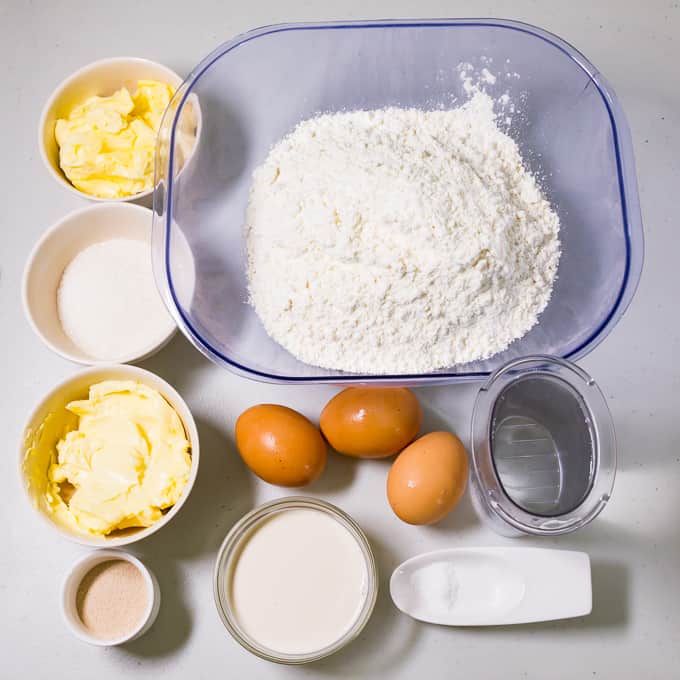
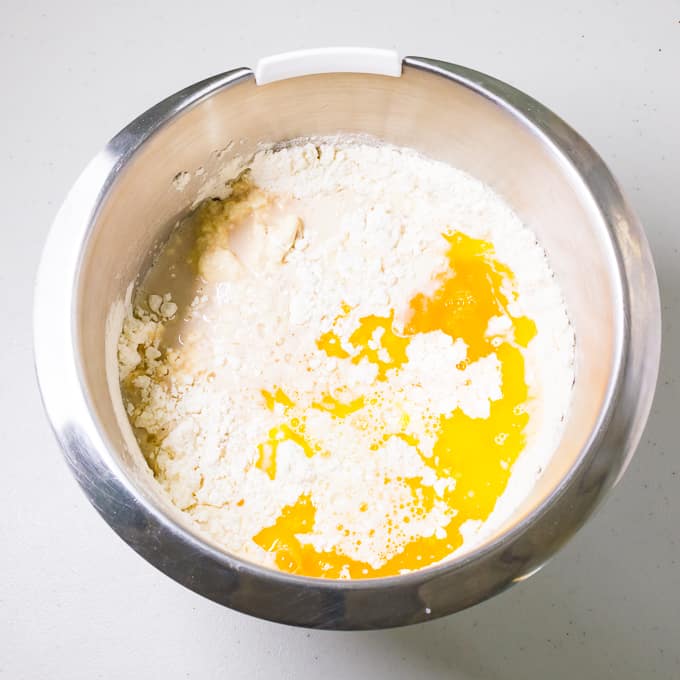
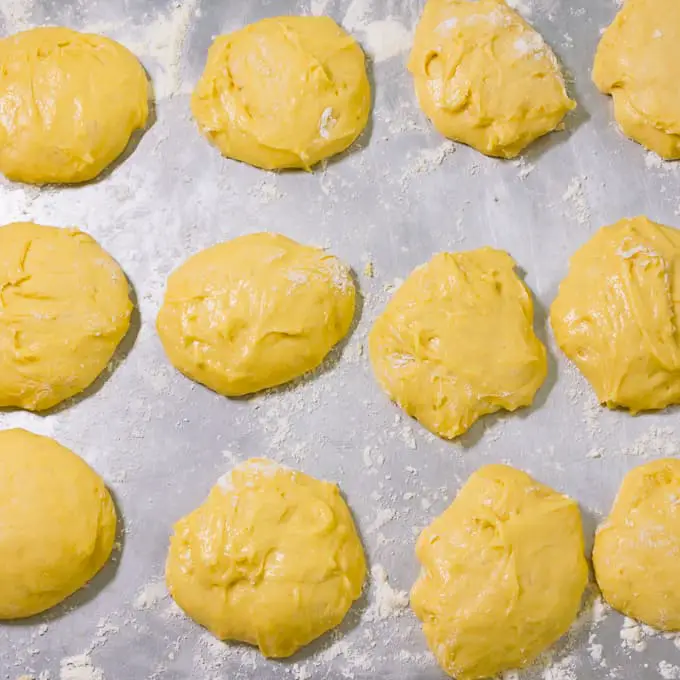
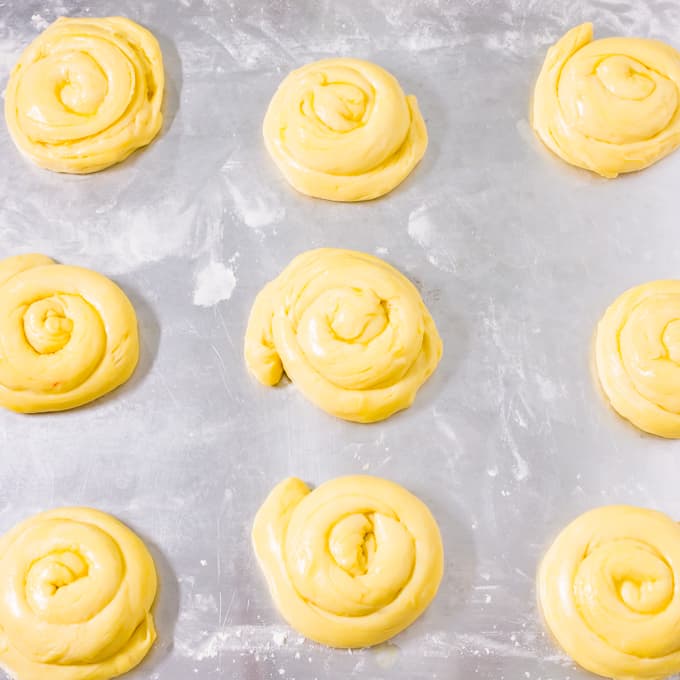
Ensaymada recipe preparation and tips (Method 2)
This ensaymada recipe involves a bit more tedious process since you have to prepare the dough and have the complete ingredients ready.
- Combine yeast and milk first into a bowl and wait for it to activate. You can always acquire yeast from your neighborhood bakery (if they also sell) or from the supermarket.
- Let the yeast sit while preparing the other ingredients such as the dough.
- For the dough, mix flour, sugar, salt, beaten eggs, and melted butter. Make sure that you’re able to mix everything well before pouring in the activated yeast. Mix it again and make sure that it’s doughy enough before kneading it.
- Since you already have added the yeast mixture and you’ve already kneaded it, put the dough back into the bowl and let it rise for a couple of hours. While waiting, you can ready the rolling pin and the flat surface where you’re going to flatten the dough.
- Bring out the dough and punch it to release the air. Then slice the dough into however many pieces you want, and start rolling it. After, dab it with some melted butter in the middle and coil it as if it were a snail shell. Place it on a tray and let it rise again for 4 hours. Once the 4 hours are done, preheat your oven and bake the dough.
- Finally, brush the buns with melted butter and sprinkle them with sugar or garnish with grated cheese.
Aside from this recipe, you can also try my Homemade beef empanada recipe and original pandesal recipe.
Note: In this article, I posted 2 methods for preparing this ensaymada recipe. You can choose between the 2.
Cooking tips
When it comes to cooking ensaymadas, there are a few things to keep in mind in order to get the perfect results.
First, make sure to use good quality flour. This will ensure that your dough is light and fluffy. You can even mix strong bread flour with regular flour for a fluffier texture.
At first, this dough is rather soft and sticky. The gluten structure will become more stretchy and less sticky as it develops. Excess flour should be avoided at all costs. The dough will get less sticky as you knead it.
It takes longer for the dough to rise when you use dry active yeast instead of quick yeast. I recommend SAF Instant Gold (which is designed exclusively for sweet dough) or Red Star Platinum.
Because they rise quickly, they have less of a chance of developing an acidic, fermented flavor. Plus, it just makes the pastry taste better, especially if you’re picky about the dough.
Second, don’t overwork the dough. Overworking it will result in a tough final product.
This dough can be prepared ahead of time. Cover it with plastic wrap and place it in the refrigerator overnight after kneading.
Allow it to sit at room temperature for 30 minutes before using, then deflate and shape it.
Finally, be generous with the butter. Butter is what gives ensaymadas their characteristically rich and fluffy texture, so don’t be afraid to use a lot of it!
Also, the key to the perfect fluffy ensaymada is to have enough patience and let the dough rise perfectly – remember flat, sticky dough is no good. Then, it’s important not to over-knead it.
Substitutions and variations
Instead of butter, you can use shortening for the dough. I prefer butter though because it tastes better.
For the flour, you can use all-purpose flour, strong bread flour, and baking flour for the best results.
You can also make an ube halaya type of ensaymada. For this version, use the same dough mix but add 1/4 of ube halaya. Then top your buns with sweet ube halaya.
Can you make vegan ensaymada?
Yes, luckily you can make this dish vegan.
It’s easiest to use the readily available vegan options from the grocery store to make the buns vegan-friendly.
Simple substitute the dairy butter with a vegan butter like Earth Balance.
Then, you can use any type of vegan “cheddar cheese” alternative and non-dairy milk like soy milk or almond milk.
Organic white sugar is vegan and you can use that too.
Variations of ensaymada are numerous:
- Majorca’s variation called Mallorca or Mallorcas de vino dulce is sweet rolls that are coated with melted queso de bola and sprinkled with sugar.
- Another variation is the ensaymada mamon which uses sponge cake batter instead of the usual dough mixture. This produces a much softer and fluffier ensaymada.
- In Iloilo, Philippines, there is also a variation called kababayan. Kababayan is an ensaymada made with a very soft and fluffy dough, and usually has less butter, cheese, and sugar compared to the traditional ensaymada. It is also shaped into a log instead of being rolled into a spiral.
- In Batangas, Philippines, there is also a variation called tsokolate eh which is an ensaymada dipped in melted chocolate.
- In Pampanga, Philippines, there is also a variation called empanadita de keso which is an ensaymada filled with cheese.
There are many more variations of ensaymada, and each region in the Philippines has its own unique take on this classic dish.
How to serve and eat ensaymada
Ensaymadas are usually served as breakfast or snacks, but can also be enjoyed as dessert. Having a soft fluffy bun with coffee or tea is the best way to enjoy it.
They can be served plain, or with a variety of toppings such as butter, cheese, chocolate, or fruit.
Ensaymadas are best enjoyed when they are fresh and warm. If you are not planning on eating them right away, they can be stored in an airtight container and reheated before serving.
It’s best to serve them as soon as they’re done baking. But, once cool, you can re-heat the buns for about 20 or 30 seconds in the microwave and serve them that way.
Similar dishes to try
Spanish bread is a type of sweet bread that is popular in the Philippines. It is similar to ensaymada, but is coated with a sugar and cinnamon mixture instead of cheese.
Mamon is a type of sponge cake that is popular in the Philippines. It is similar to ensaymada, but uses sponge cake batter instead of the usual dough mixture. This produces a much softer and fluffier ensaymada.
Pandesal is a type of bread that is popular in the Philippines. It is similar to ensaymada, but is made with a different dough mixture and does not have any cheese or butter.
FAQs
What equipment do you need to make ensaymada?
To make ensaymada, you will need a measuring cup, a mixing bowl, a baking sheet, a mixer, a rolling pin, and a grater.
You can use a dough mixer to knead the dough.
Learn more about the most essential kitchen utensils and equipment here
How do you store ensaymada?
Ensaymadas can be stored in an airtight container and reheated before serving.
Store the buns in the fridge for up to 5 days or in the freezer for up to 7 days and then thaw and reheat them.
Is ensaymada healthy?
There is no definitive answer to this question as it depends on how the ensaymada is prepared.
Generally speaking, ensaymada is not considered a healthy food because it is high in calories and fat. However, if the ensaymada is made with whole wheat flour and low-fat milk, it can be healthier.
But this is a nice junk food type of snack and shouldn’t replace healthy meals.
Learn how to Put a Healthy Spin on Traditional Filipino Foods here
Conclusion
There are many variations of the classic Filipino dish, ensaymada. Each region in the Philippines has its own unique take on this dish.
Ensaymadas can be served as breakfast, snacks, or dessert.
They can be plain or topped with butter, cheese, chocolate, or fruit. They are best enjoyed when they are fresh and warm. Similar dishes to try include Spanish bread, mamon, and pandesal.
The fun part about eating ensaymada with the family is that you can top them with all kinds of sweet or savory toppings and turn this snack into the ultimate comfort food.
If you are more into savory snacks, why not try Spicy Dilis, a Filipino dried anchovies snack next
Check out our new cookbook
Bitemybun's family recipes with complete meal planner and recipe guide.
Try it out for free with Kindle Unlimited:
Read for freeJoost Nusselder, the founder of Bite My Bun is a content marketer, dad and loves trying out new food with Japanese food at the heart of his passion, and together with his team he's been creating in-depth blog articles since 2016 to help loyal readers with recipes and cooking tips.
